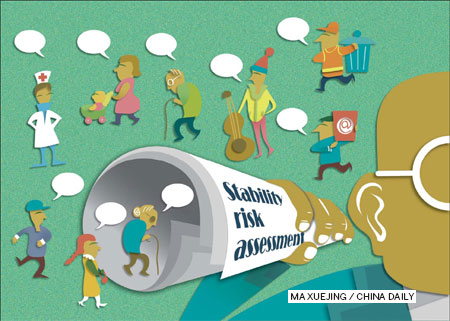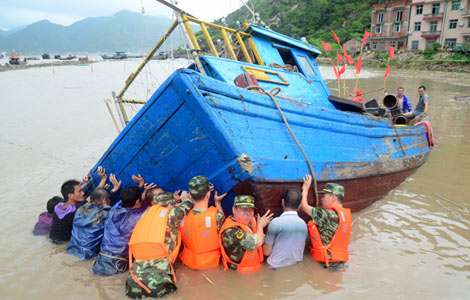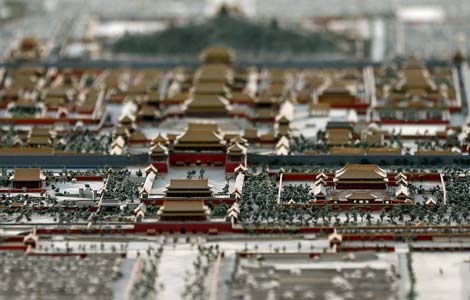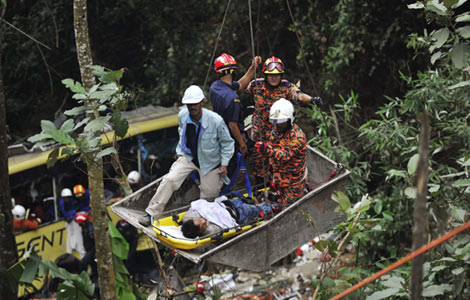Public opposition defuses nuclear plans
Updated: 2013-08-23 08:29
By Qiu Quanlin (China Daily)
|
||||||||


Risk assessments lead to stricter requirements, reports Qiu Quanlin in Heshan, Guangdong province.
Xiao Jianliang returned to work on his farmland shortly after plans to build a nuclear fuel facility in his village were dropped.
"The land was earmarked for the plant two months ago, but we haven't been paid compensation because the project was canceled. So we have to quickly begin planting crops on the land," he said.
The Longwan Industrial Park project, which was to be situated in the area around Heshan, a city in the Pearl River Delta region, was planned as a facility for uranium conversion, enrichment and the manufacture of nuclear fuel equipment.
However, following opposition by a majority of residents, the local government announced on July 13 that the project had been canceled and that it will not reapply for approval to start construction at a later date.
Xiao, 54, who lives in Lianzhu, the site of the planned project, said that residents initially hadn't displayed a great deal of concern about the project, even when the local government began claiming their land earlier this year.
"They (the local government) promised to pay us for the land. But a large number of residents expressed strong opposition because of the possible environmental risks," he said.
The project was dropped followed criticism from residents in the Pearl River Delta region after the local authorities issued a public notice announcing a "risk to social stability" assessment on the project on July 4.
The planned facility, jointly owned by China General Nuclear Power Corp and China National Nuclear Corp, the main body of the national nuclear technology industry, is just 30 kilometers from the heart of Jiangmen city, which administers Heshan.
"The real pressure came from opposition by residents in the delta region. They knew very little about the project and were concerned about the potential risks to the local environment," said a Heshan government official, who spoke on condition of anonymity.
Concerns about possible nuclear leaks and environmental pollution spread rapidly online in the wake of the risk assessment notice, the official said.
Residents of Jiangmen and other nearby cities "took a walk" on the streets to protest the project. They carried banners and wore T-shirts bearing slogans calling for a halt to the proposed facility.
"We had planned a period of 10 days to canvass public opinion and conduct the social stability risk assessment. But that wasn't enough time for us to promote understanding of nuclear fuel," admitted the official.
A key project
The 37 billion yuan ($6 billion) cost of the project, South China's first planned industrial park for the production of nuclear fuel, was to have been borne by the local government and the companies, according to sources within the local government.
The facility would have supplied power plants in Guangdong and neighboring Fujian province, and would have had an annual production capacity of 1,000 metric tons of uranium by 2020.
The Guangdong Provincial Reform and Development Commission approved construction of the project in December, naming it as a key project during the next five years. By March, the local government had signed a construction contract with CGNP and CNNC.
Once the contract had been signed, the government and the companies arranged for experts to conduct preliminary work, such as selecting a suitable site and undertaking an initial assessment of the possible environmental impact, according to the official.
Crucially, however, the locals hadn't been told about the plan and the first they heard of it was when the notice announcing the risk to social stability assessment was posted.
"Now you see the result. It wasn't something we'd bargained for. The project would have boosted the local economy. We have learned lessons from the project; we didn't conduct an efficient and practical promotion of nuclear fuel before canvassing public opinion. That's why a large number of residents demonstrated their opposition," the official said.
"We should also have better informed residents outside Heshan about the project. People from cities in the delta region, in particular, displayed great concern. They were worried about potential nuclear leaks when the project was put into operation," he added.
However, Chen Anxiu, of Jiangmen Nuocheng Consultant Co, the company responsible for conducting the assessment, said the public manner in which it was conducted was part of a series of measures intended to keep the residents well informed.
"A final risk assessment has yet to be undertaken. We will still conduct the assessment, even though the project has been canceled," said Chen, who added that the assessment was in line with regulations established by the central government.
In days gone by, the process of commencing work on large projects was relatively quick and simple, but rules introduced by the National Development and Reform Commission in the second half of 2012 have imposed much more stringent requirements, according to Chen.
For example, large local projects must be halted temporarily if they meet with "medium-level" opposition, according to the regulations.
Specifically, the new rules have added a mechanism for assessing a project's potential risk to social stability to the evaluation procedure.
According to the rules, all local projects requiring NDRC or State Council approval are required to submit an assessment of the risks to social stability with their applications.
Before, local governments were only required to submit environmental and land assessments when applying for approval of large construction projects.
"Local governments are facing stricter requirements when it comes to seeking permission to launch large investment projects," said Feng Shengping, a researcher with the Guangdong Provincial Situation Research Center.
According to the rules, the NDRC will not approve any project if it is assessed as posing "medium or high-level risks to social stability".
"That's not just advice, it's a mandate," said Feng, who believes the local government should have informed the public earlier about the planned construction of the facility in Heshan.
"Within a short time, residents would have known more about the project, especially if the local government and the construction company had emphasized that it was safe to develop the facility," Feng said.
Prior to issuing the social stability risk assessment notice, the local government had earmarked around 144 million yuan to compensate the locals for the loss of some 229 hectares of farmland.
"We had to cancel the project because a majority of nearby residents demonstrated strong opposition. We respect the residents' opinions and will not apply for approval of the project," Wu Yuxiong, mayor of Heshan, told a media briefing in the aftermath of the decision to drop the plan.
Han Zhipeng, a political advisor in Guangzhou, the capital city of Guangdong province, partly attributed the cancellation to inadequate public information.
"Why did most people know so little about the project before the assessment of risk to social stability was announced? The public should be better informed," he said.
The lack of information about the project led many residents to mistakenly believe that a nuclear power station was to be built, rather than a fuel-processing plant, according to Han.
"At such a sensitive time, it was hard for most people to believe that the project would not pose a threat to the environment, even though the government reiterated the importance of safety of construction and operation," Han added.
Neither CGNPC nor CNNC has commented publicly about how projects such as this will be handled in future.
An ideal location
Heshan is an ideal place to process nuclear fuel, given its close proximity to nuclear power stations in South China's coastal area, according to CNNC sources.
By contrast, the two existing nuclear fuel-processing plants are located in the downtown areas of Baotou city in the Inner Mongolia autonomous region and Yibin city in Sichuan province.
The NDRC rules came into being after several large projects were halted in the past few years as a result of vocal opposition from residents. For example, in October, a decision was taken to shelve plans to build a 55.8 billion-yuan petrochemical plant in Ningbo, Zhejiang province. The decision to halt the Zhejiang refinery was, to some extent, connected with the requirements set by the NDRC, according to local officials.
"The fact that the public opposed the project was a sign that the evaluation process was inadequate," said Han.
Early reports said that the project was still in the early-planning stage and the Ningbo government had planned to conduct an environmental impact assessment and a public survey on the risk to social stability.
Although the local government said the project had met "the most stringent discharge standards and would not pose a threat to the environment", residents demonstrated for days because they were concerned about the potential for pollution.
In a separate incident, the NDRC ordered the developers of a planned steel mill in Anhui province to conduct a social stability risk assessment, even though an environmental assessment had been completed and the project was well on the way to being given the green light.
Prior to the new NDRC regulations, which only apply to top-level investment projects, some local governments had already introduced similar rules.
For example, the authorities in Guangdong introduced a similar mechanism in 2011, requiring that proposals for large local projects must always include an assessment of the risk to social stability.
The southern province has seen a decline in mass disturbances in the past two years, and now only around 1,500 such cases occur annually, according to sources with the Guangdong political and legislative affairs committee.
Mass disturbances are often sparked by plans for the construction of large projects, the committee said.
According to the Guangdong regulations, local governments are required to conduct a survey of the risk to social stability - including an assessment of the likelihood of mass disturbances, the numbers expected to be involved and the scale of possible disturbances - before major policies and reform measures are announced or construction work begins on key projects.
In 2011 alone, 54 key policies and 36 large projects were suspended in Guangdong after being assessed as posing a high risk to social stability, according to sources with the local political and legislative authority.
"Guangdong has taken the lead in the introduction of this sort of assessment mechanism. After all, the province has witnessed a number of mass incidents in the past few years," said Han.
In 2009, plans to build a garbage incinerator in the Panyu district of Guangzhou were dropped after large-scale protests by residents concerned about the possible environmental impact.
Following the NDRC's new rules, several other provinces and municipalities, including the coal-rich province of Shanxi and the megacity of Chongqing, have announced similar rules for local investment projects, said sources with the local governments.
"Regulations such as these are a big step forward. But some confusion remains as to how these social risk assessments should be carried out and which government agency should be responsible for conducting them," said Han.
"In addition to the social risk assessment, local governments should better inform the public about proposed large projects before making a final decision."
Contact the writer at qiuquanlin@chinadaily.com.cn
(China Daily 08/23/2013 page6)
Most Viewed
Editor's Picks

|

|

|

|

|

|
Today's Top News
McCain comments about Diaoyu draw fire
Chinese scientists asked to improve toilet
Bo Xilai denies bribery charges
Experts say police need guns on patrol
Nasdaq resumes stock trading
German mitten crabs not 'qualified for import'
Chinese netizens debate upping retirement age
Egypt's Mubarak leaves prison
US Weekly

|

|















